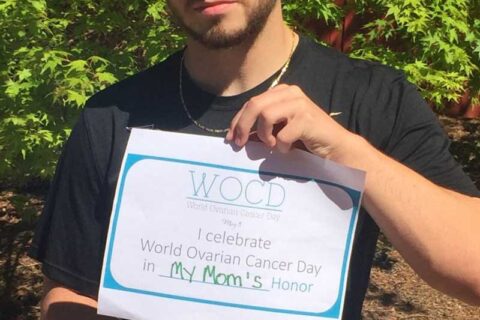Ovarian Cancer Awareness Month – All About the Cancer That Whispers
Promos and plans are already very visible for the upcoming October Breast Cancer Awareness month. I am confident that the significant focus on breast cancer each October has saved many, many lives. It is important, it impacts 1 in 8 women and early detection (like any cancer) makes a huge difference. It’s about education and about raising funds for research. I wouldn’t change anything about that focus and the celebration of the survivors every year.
Here’s my issue. September is Ovarian Cancer Awareness month. Did you know that? True, it doesn’t impact as many people – 1 in 65, but it has a really poor survival rate, largely because there is no screening test (YET!) – it is initially diagnosed only by symptoms today. And by the time you have the worst symptoms, you’re typically at stage 3 or 4. It’s called the cancer that whispers. Maybe you don’t know why. Let me tell you my diagnosis story.
Clearly I didn’t care much about ovarian cancer until I was directly impacted. I had all my regular screening appointments – mammograms, self-exams, pap smears, physicals, etc. and thought I was safe. But you can’t screen for this. For 3-4 months I had been struggling with a cough, shortness of breath, problems urinating, bloating, and some pelvic pain. Initially the doctor wanted to rule out a bladder infection which they did. For the most part, the doctors then assumed my pain was pulled muscles from my cough and I believe they disregarded my bloated stomach because I am overweight and to them, I just looked fat. After x-rays showed fluid on my lungs, I was twice diagnosed with pneumonia and went through 2 rounds of antibiotics and steroids. And my other symptoms were still being ignored. After completing the last round of pneumonia treatment, my stomach was becoming more and more distended. I looked 8 months pregnant. After a visit to a clinic nearby, they immediately sent us to the ER with an order asking for a CT scan for a potential intestinal blockage of some sort. After some testing was completed, the ER doc who had previously diagnosed me with pneumonia (several weeks earlier) came in and told us the CT scan had some alarming results, a couple of masses in my lower abdomen and some abnormalities. I had ovarian cancer, and the fluid in my lungs was cancerous fluid that had been pushed up into my lungs because it had nowhere else to go, it wasn’t pneumonia and thankfully it wasn’t actually metastasized to my lungs. In the end, my symptoms escalated for a period of about 6 months before I was finally diagnosed.
These symptoms were all fairly common for ovarian cancer but I didn’t know that, nor did some of my doctors (including this ER doc). What if? What if I had known the signs and symptoms? What if I had pushed harder because I knew something was wrong? What if my doctors had been more aware of ovarian cancer? Would 6 months have made a difference? Maybe stage 1 or stage 2? What. If.
So how do we educate people more broadly? There is a significant amount of information on ovarian cancer on the internet – I just didn’t know because I didn’t need to. But as it turns out, I DID need to know. Everyone needs to know. Everyone.
Know the Signs and Symptoms – And Spread the Word.
First, know your family history if possible as it’s an important part of the formula.
Signs and symptoms of ovarian cancer may include:
- Abdominal bloating or swelling
- Quickly feeling full when eating
- Weight loss
- Discomfort in the pelvis area
- Changes in bowel habits, such as constipation
- A frequent need to urinate
It’s easy to ignore those or to blame them on something else. What woman doesn’t suffer from the occasional bloating or constipation? And I already had reflux so it was easy to just see this as some other GI distress. Our stories all sound similar –common symptoms, and usually not very severe. Don’t ignore it when you think something is wrong. And don’t let your doctors ignore it either. The more we all know, the more lives we can save.
In closing…
- Don’t ignore your symptoms. You know your body. Push your doctor if you have to. Make them hear you. It could save your life.
- Spread the word. Talk about ovarian cancer! Wear teal this month and show your support!
- Get involved – follow OCI progress on the diagnostic screen (close to FDA approval) – this is a game changer.


